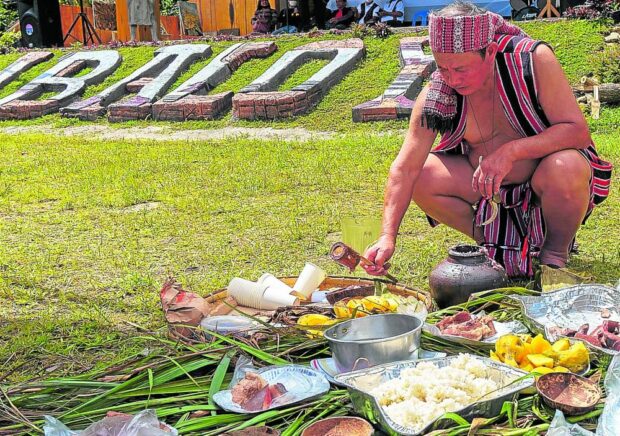Ancestral land titles in Baguio forest voided

Ritual blessings performed at the 2022 Ibaloy Festival. (Photo by NEIL CLARK ONGCHANGCO / Neil Clark Ongchangco / Inquirer Northern Luzon_)
BAGUIO CITY, Benguet, Philippines — The Supreme Court has nullified the ancestral land titles of another Ibaloy family in this city because Baguio is excluded from the protections guaranteed by the country’s law on indigenous peoples’ (IP) rights.
But the high court’s latest decision, which was issued on July 11, 2023, but posted on its website only this month, also clarified that the rights of indigenous peoples continued to be safeguarded by the United States Supreme Court decision in 1909 called the “Native Title” doctrine, which recognized ancestral lands during the American colonial period.
The Supreme Court reiterated its previous rulings that Section 78 of the Indigenous Peoples’ Rights Act of 1997 (Ipra or Republic Act No. 8371) exempts the Baguio Townsite Reservation from its coverage since the city would continue to be governed by its charter.
“Thus, no ancestral title under the [Ipra] may be issued in favor of claimants within Baguio City,” according to the en banc decision penned by Senior Associate Justice Marvic Leonen.
The Supreme Court had addressed the state’s petition for review of a 2013 Court of Appeals decision which upheld four Certificates of Ancestral Land Title (CALTs) inside a Baguio forest that was granted in 2008 by the National Commission on Indigenous Peoples (NCIP).
Article continues after this advertisement“The [NCIP] has no authority to issue ancestral titles over territories declared part of Baguio City prior to the enactment of Ipra. Only when Congress reclassifies these properties through law will the NCIP have the authority to issue ancestral titles over Baguio City,” it said.
Article continues after this advertisementBut Ipra “does not overturn the doctrine laid down in Cariño v. Insular Government, which recognizes ownership of land occupied and possessed since time immemorial,” the court pointed out.
Native ownership
The Native Title doctrine arose from a lawsuit filed by Ibaloy clan leader Mateo Cariño against the American colonial government for seizing his property in what is now Camp John Hay.
According to the US high court, Cariño may not have titled his lands while Spain governed the country, but he retained his “native” rights because he had occupied his property “since time immemorial.”
Leonen, in the Supreme Court decision, said that when land had been held under private ownership, “it is presumed to have been held in the same way from before the Spanish conquest.”
“Hence, by proving occupation since time immemorial, the land is presumptively private and the burden of proof shifts to the government to show that the land was ceded to the State,” the Supreme Court noted.
Despite Baguio being exempted from Ipra’s operation, the Supreme Court said, “Claimants may still pursue registration of title and prove their ownership in accordance with Cariño.”
The Supreme Court decision, however, nullified the CALTs issued to the heirs of Lauro Carantes because they have not established possession of the property “since time immemorial.”
Nullified
Their CALTs cover five ancestral land parcels within the city’s Forbes Park, declared a forest reservation in 1924 through Proclamation No. 10.
“Unlike the claimants in Cariño, the heirs of Carantes failed to show that they have been possessing and occupying the land since time immemorial. Hence, there is no presumption that the land is private, and no ownership may be recognized in favor of the heirs of Carantes,” the Supreme Court said.
It added: “As discovered by the Department of Environment and Natural Resources, the land claimed has not been traditionally occupied by the heirs of Carantes and their ancestors. In fact, the land has been occupied by other individuals with vested property rights, such as the Camp John Hay, Baguio Country Club, and Baguio Water District. Moreover, the land has been declared and recognized as a forest park reservation.”
According to the high court, the heirs were descendants of Mateo Carantes, a cousin of Mateo Cariño, who sold a portion of their claims to a private company before they were awarded the CALTs.